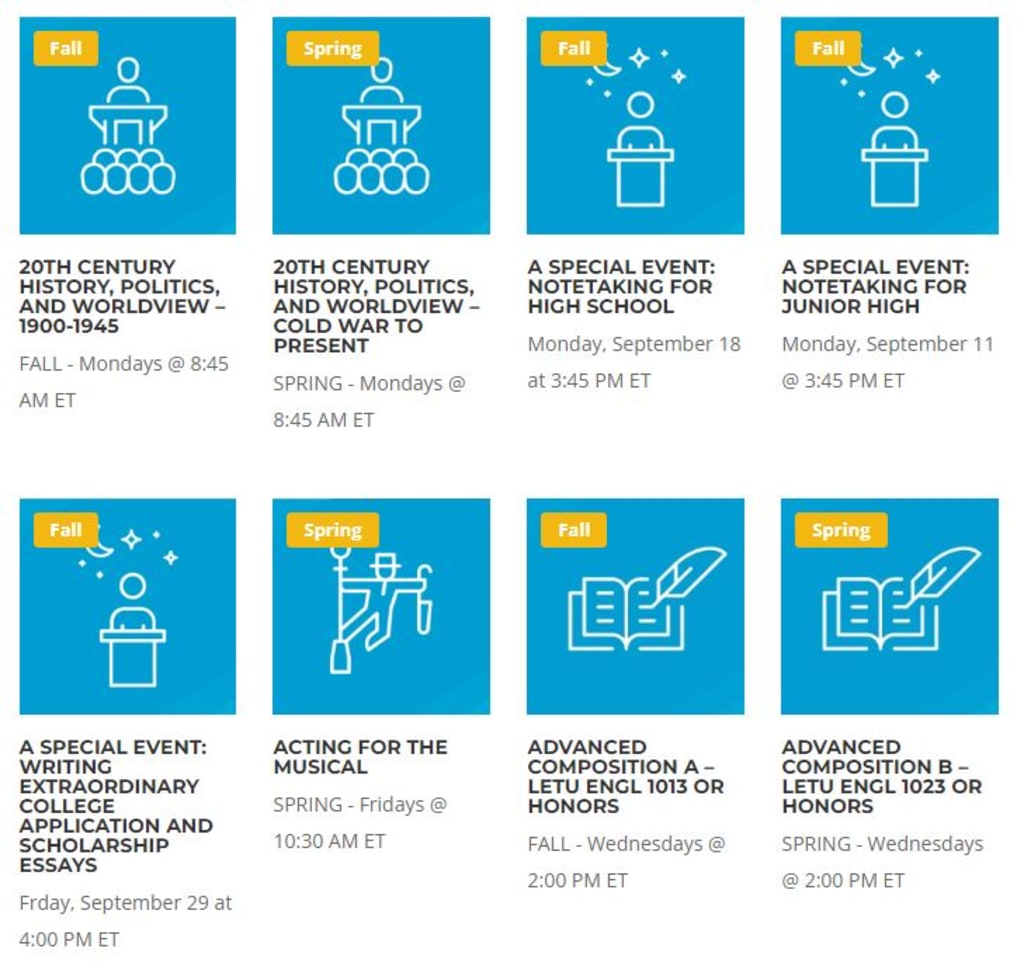Christian Homeschool Curriculum Guide & Resources | Excelsior Classes
Finding a great Christian Homeschool Curriculum may be much more challenging than it initially appears.

Finding a great Christian Homeschool Curriculum may be much more challenging than it initially appears.
There are many options to pick from that offer a range of pedagogical, instructional, and theological ways of teaching. It is often difficult for parents to choose one that is suited to their specific requirements, values, and philosophy of homeschooling.
To assist parents in making an informed choice to make a better choice, we've created this informative guide on Christian Homeschool Programs.
It aims to aid parents to understand and understand certain important issues they'll have to take into consideration and provides some suggestions on faith-based curricula that cover various subjects they could consider.
What Is A Christian Homeschool Curriculum?
Because of the increasing popularity of homeschooling within Christian families, Christian homeschooling is one of (if not the) most popular kinds of homeschooling, and there are plenty of options and programs available.
Amid a variety of philosophical philosophies and approaches to pedagogy, including denominations, for Christian education, homeschooling may be a bit difficult to define what is the best Christian homeschooling program and what it is not.
There are a few aspects that differentiate these Christian Homeschool Programs from their neutral or secular counterparts. This can be an effective way to classify them.
Contrary to secular homeschooling or traditional public education like a Christian curriculum will use explicit and specific connections in its instruction to God or faith, as well as Scriptures like the Bible, and will attempt to link the subject matter of its curriculum to Christian convictions to a certain extent or the other.
Additionally, if a Christian Homeschool Curriculum is required to address potentially controversial subjects, like evolution, for instance, it will emphasize the need for a Biblical perspective.
What Subjects Do Christian Homeschooling Curricula Cover?
The faith of a person can be a crucial or even a central component of the educational system and it shouldn't be a shock that lots of Christian families who homeschool want the materials they employ to be reflective of this belief as closely as possible.
Although those who are new to homeschooling may be conscious of Christian science curriculum It may be an unwelcome surprise to many that education providers offer strong religiously-based, faith-based curriculums covering almost every subject within the K-12 age range.
For instance, Christian language arts programs as well as history and social studies programs, economics, and many more.
There are also thorough and rigorous math courses that take a Biblical worldview, and link the fundamentals of the subject with faith-based stories and traditional methods, as well as explanations that highlight traditional values, God's plans, and the splendor of His creation by mathematics, and more.
Things to Consider When Choosing a Christian Homeschool Curriculum
Denominations
There are a variety of religions of Christianity that exist and Protestantism, Catholicism, and Eastern Orthodoxy being the three most popular.
With Protestantism particularly it is also home to many branches, including Baptist, Methodism, Adventism, Lutheranism, Presbyterianism, and many more.
Additionally, there are a variety of Christian homeschooling curriculums that are specifically designed to be aligned with these streams, which allows parents to closely and precisely ensure that their child's learning is in line with the values and beliefs of their community.
Many homeschool curriculums adhere to a general Christian worldview, not making a focus on one particular theology, but instead taking into account the fundamental Christian values and morals, God, Jesus, and the Bible.
Parents are therefore required to conduct an evaluation of their own religious needs and preferences along with the contents of any Christian course they're considering about.
Particularly, parents have to decide if they'd prefer a program with a specific Christian belief system, which will enhance learning and fit with theology but restrict their choices a bit as well as an overall Christian approach, which will increase the variety of curriculum options but could require some adjustments from time to time.
Curriculum Style and Approach
Many think that a Christian homeschooling curriculum is using a more traditional Classical method of learning.
While this may be true for certain parents, today you have access to Christian homeschooling classes which employ a variety of methods to instruct children.
It is possible to find, for instance, Christian Homeschool Programs that follow the Charlotte Mason approach and make use of live books as well as narration exercises as well as the study of nature, narration/copy work, and many more to help instruct their students.
There are as well Montessori curriculums that blend Christian principles and beliefs through hands-on, interactive play, and a self-directed learning method.
It is also possible to do Christian Unit studies, as also, where students spend a period working on thematically related issues across various subjects.
There are many different Christian homeschooling options, which are sure to incorporate elements of other methods to meet the needs of the student and their objectives.
And, just as in the case of neutral or secular math curriculum, Christian parents have the choice of selecting curricula that tend to be more formal and traditional (focusing on ensuring that students be able to respond to questions in a timely and precise manner using drills and math facts) or ones which are more conceptual (focusing on helping students comprehend why math works in the way it does and also helping them build a stronger strategic and critical mathematics thinking).
The different methods are something parents must consider when evaluating the curriculum for their homeschool.
The strategies a program employs can have a significant influence on the roles of parents, students, and the overall structure of the lesson throughout the year. It might not be the easiest or most familiar for families to utilize.
Degree or Depth of Biblical Integration
As we've discussed that what is the definition of a "Christian Homeschool Curriculum" can be quite ambiguous.
While the various Christian Homeschool Programs offered on the market have a general theme of including God and the Bible as well as Christian principles in their instruction, however, the extent to which they do this is quite different.
Certain programs can incorporate Christian beliefs and perspectives in the topics they cover with a significant amount of time studying the subject matter and directly linking the subject with Scripture as well as Christian morals and philosophical theories.
Some however tend to focus on the topic that is at hand and only use a few or subtle mentions of God, Christ, or the Bible.
Which is more suitable is dependent on the homeschooling of each student and their individual preferences.
Certain families, for instance, could want that the topics they are learning about to be delved into Christian ideas, with the lessons that are the extension to Bible study, and helping to strengthen and enhance the core values of a child whenever it is possible.
Others, on the contrary on the other hand, may prefer a greater focus on the content and may be content if the program is well-organized and provides an approach that is Christian-friendly to complex topics, and/or includes references to the scriptures here and there.
It's important to remember that not all subjects lend themselves to an enduring and profound connection to the religious subject matter, such as math being extremely skill-based and heavily dependent on training, review, and practice of particular abilities.
Even if they're produced by reputable Christian firms, could appear "light" as far as their Biblical worldview is in the first place (using stories that are Christian-themed, for the issue, for instance) since they're not given lots of chance to make it happen.
Methods of Teaching
Similar to other homeschool curriculums, parents will have to be aware of the manner that the Christian school curriculum imparts its subjects during a lesson.
Certain Christian Homeschool Programs employ the traditional route using readings, writing exercises, workbooks, and/or lectures to present information in a simple easy, simple and familiar manner.
Some may prefer a multisensory approach to learning employing activities like art, music, illustrations, craft, hands-on work as well as manipulatives. Outdoor games, entire body movements, and more assist students in better comprehending and retaining the information.
We have a preference to use multisensory education because it helps make lessons more interactive, engaging, and memorable, we be aware that they could cause lessons to be more lengthy and can be distracting, and may not be suitable ideal for all students (some prefer a straight approach).
Therefore, parents must think about what could be effective for their child and homeschooling.
Parent-led or Self-Study
One problem that a lot of Christian homeschooling families face the present is time.
As with secular schools, certain Christian Homeschool Curriculum is led by parents which means that parents are both administrators and teachers by sitting down, creating lessons, instructing them, and then assessing the performance of students.
Although this can provide plenty of positive interactions between parents and students, as well as one-on-one instruction it does require an enormous amount of time and energy from parents. This may be difficult to budget, especially for large families and families with busy schedules.
It could also be an issue for those parents novices to teaching, or feel that their abilities are inadequate in a specific subject like mathematics or sciences.
Parents with children may prefer more self-study curriculums that make use of software, books, videos, or other tools to teach the students and lead them through the lessons without the need for immediate parental intervention or action.
In self-study programs parents typically assume the role of administrators in ensuring that students remain on track and assist in solving any issues that arise which is a great benefit for parents who are busy and doubtful of their abilities to instruct students directly.
On the other hand, although it might not be a good alternative for every student (notably children, pre-readers, and students who require more intensive supervision) It lacks that personal bond to the teacher that many homeschooling parents want and requires parents to have a substantial amount of faith in the materials used by the program.
Online Vs Offline Learning
The vast world of technology has been introduced to the Christian homeschooling community, bringing the world of technology with it a wide range of homeschooling curricula online.
The Christian Homeschool Programs offer parents numerous advantages, for example by providing fun and engaging multimedia lessons, cloud-based learning resources as well as digital games, and activities with sophisticated progress tracking as well as automated tools for grading.
Depending on the program and the question, these tools could create more engaging and fun for students as compared to offline programs. It will make teaching much simpler and time-saving for parents.
However, compared to traditional offline/paper-and-pencil curricula, these online Christian Homeschool Programs do increase a student's screen time significantly and many parents may feel uncomfortable leaving their student alone with an internet-connected device.
Additionally, an online course generally requires the Internet to be used, and some families might reside in areas where the Internet is not reliable or slow which could cause interruptions in learning.
About the Creator
Tom Latham
I Will Provide You With The Best Informative Articles.






Comments
There are no comments for this story
Be the first to respond and start the conversation.